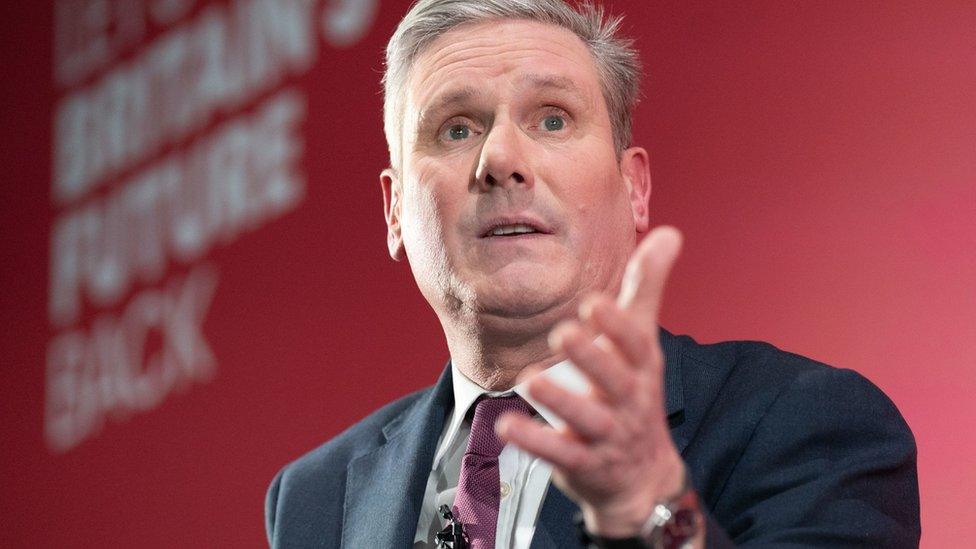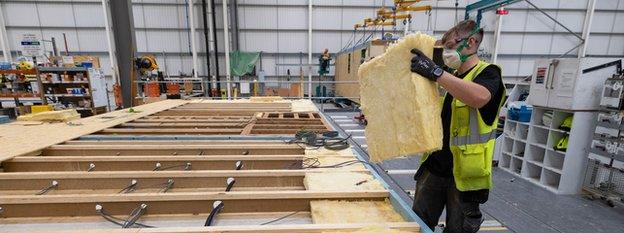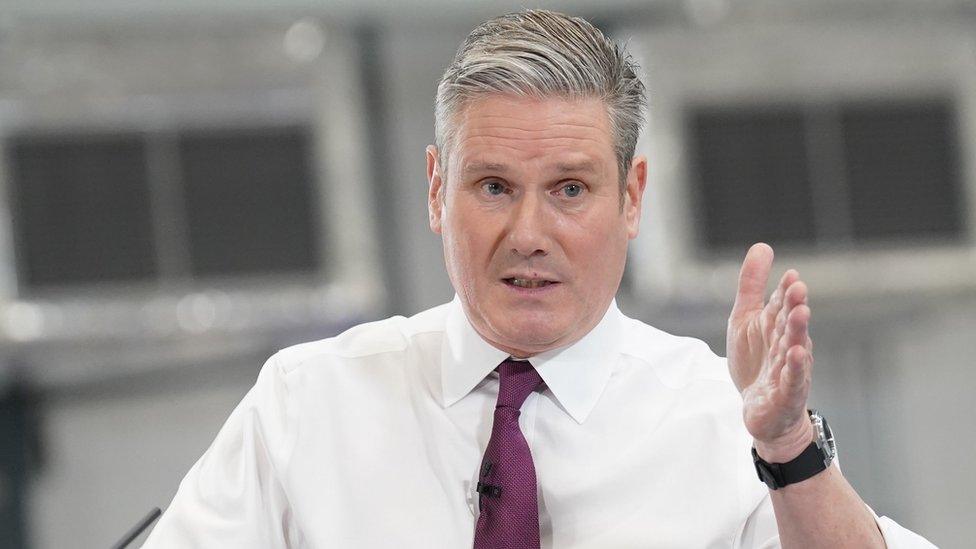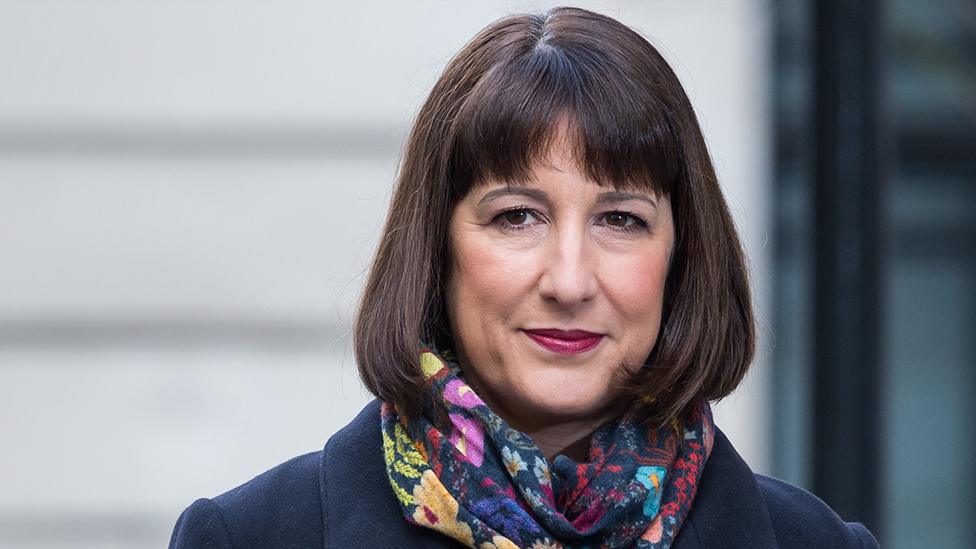Keir Starmer: Labour ditches £28bn green investment pledge
- Published
- comments

Labour is ditching its policy of spending £28bn a year on its green investment plan, in a major U-turn.
The spending pledge, announced in 2021, had been a key part of the party's plans to reach climate targets and secure green jobs.
Sources insist the plan, which includes creating a publicly-owned green power company, is not being dropped altogether.
But Labour will no longer commit to investing £28bn a year to deliver it.
Labour's position on the policy in recent weeks has been increasingly muddled, with some senior figures repeatedly refusing to use the £28bn figure when pressed in interviews, while others, including party leader Sir Keir Starmer, continued to do so.
It is expected Labour will argue that they have to focus on being seen as responsible stewards of the economy, rather than committing to a spending pledge that opponents regard as reckless.
It comes on the same day the EU's climate change service announced that global warming has exceeded 1.5C across an entire year for the first time.
Labour's plan was to spend £28bn a year on green energy projects, like offshore wind farms and developing electric vehicles.
The spending pledge, first announced by shadow chancellor Rachel Reeves in September 2021, was to be funded by borrowing.
That pledge was watered down last June, with the £28bn target adjusted so that a Labour government would meet it about halfway through its first term rather than in its first year.
The party has also specified that this figure includes around £8bn a year in planned government green spending, making the extra spending commitment compared to the Conservatives more like £20bn.
At the time, Ms Reeves said the party needed to be "responsible" with the public finances, given the poor economic backdrop and rising cost of borrowing.
Since then there have been growing questions about whether the policy could be scaled back further.
In an interview last month, Sir Keir described the £28bn figure as "a confident ambition", which was subject to the party's fiscal rules.
These include that debt has to be falling as a share of the size of the economy in five years.
However, unlike some of his shadow ministers, he has continued to use the figure as recently as Tuesday.
'Wriggle out'
Rishi Sunak said Labour's change in approach, set to be confirmed by Sir Keir later, was a "serious moment" that showed the Labour leader "U-turns on major things, he can't say what he would do differently".
"This was the flagship plank of Labour's economic policy and it now looks like he's trying to wriggle out of it," he told reporters.
The prime minister has repeatedly attacked Sir Keir over the policy, suggesting that the borrowing to deliver it would require Labour to raise taxes.
The Conservatives have increasingly put the policy at the centre of its attacks on Labour in recent weeks, ahead of a general election expected this year.
Privately, Labour figures acknowledge a long-standing "brand weakness", as one source put it, when it comes to economic credibility.
So the decision has been taken to focus on attempting to reassure voters they can be trusted with the economy, rather than keeping the £28bn promise.
The Institute for Fiscal Studies, a think tank, has previously said, external the £28bn spending pledge would have delivered "high levels of public investment by recent UK standards".
But it has pointed out that the spending, even if delivered, would still see public investment fall in real terms by 2029 compared to now, because of spending freezes pencilled in by Tory ministers for after the election.

What does this mean for Labour's plans?

The consequences of Labour scaling back the £28bn figure are hard to assess - as the party has never said precisely where all the money would go.
The spending commitments it has made fall some way short of that figure, meaning it's never been clear how it would reach it in any case.
The party has specified it would spend up to £6bn a year on loans and grants for families to improve home insulation, and £500m a year on grants to companies bringing green jobs.
There's £8bn for investment funding, including £2bn for eight battery factories, and £1.8bn for nine "renewable-ready" ports.
This would also see £3bn for six "clean steel" plants. Shadow minister Nia Griffith has told the BBC this figure is "definitely being kept".
But this £8bn investment total is a one-off figure, rather than annual.
And the party has also never specified how much it would spend on GB Energy, the publicly-owned clean generation company it wants to set up.

The move to ditch the spending promise was criticised by left-wing campaign group Momentum and Unite, Labour's biggest union backer.
"This latest Starmer U-turn represents yet another capitulation to right-wing interests," a Momentum spokesperson said.
"Sadly, there is a huge gap emerging between the scale of the economic and environmental crises facing us, and the solutions being offered by a Labour leadership afraid of its own shadow."
Unite leader Sharon Graham said: "The Labour movement has to stand up to the Conservatives' false accusations of fiscal irresponsibility.
"There is a catastrophic crisis of investment in Britain's economic infrastructure."
Carla Denyer, co-leader of the Green Party, said: "This is a massive backward step - for the climate, for the economy and for good quality jobs.
"Both the security of our planet for future generations and the UK's future prosperity is dependent on greening our economy and that requires large scale investment."
Related topics
- Published7 February 2024

- Published5 January 2024

- Published9 June 2023
